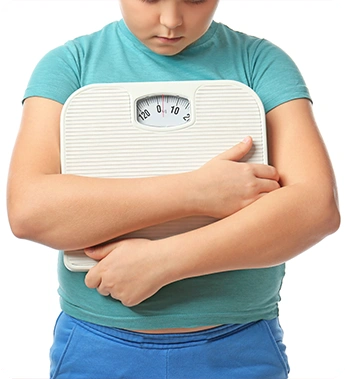Natural, Personalised Care for Childhood Obesity
Helping Kids Achieve a Healthy Weight with Expert Homeopathic Care
Book your Appointment
Childhood obesity is one of the fastest-growing health concerns among children today. A study published by the World Health Organization states that 160 million children and adolescents aged 5–19 are living with obesity
From unhealthy eating habits to genetic and hormonal causes, obesity in kids can lead to physical discomfort, low self-esteem, and future complications like diabetes, asthma, and heart conditions
At Dr Batra’s®, we understand the emotional and physical toll obesity can take on a child’s life. That’s why we offer compassionate, root-cause-based care through safe, child-friendly homeopathic remedies, personalised nutrition guidance, and lifestyle coaching to promote healthy growth naturally
With over 40 years of clinical experience, Dr Batra’s® offers a holistic, customised approach to gently and effectively managing obesity in children
Child-Specific Homeopathy
Safe, side-effect-free remedies tailored to hormonal imbalances, emotional stress, and lifestyle triggers
BFit – India’s First Doctor-Led Weight Reversal Program
A team of experts—doctor, dietician, fitness coach & diabetologist—working together for your child’s healthy weight
Trusted by Parents Worldwide
Over 15 lakh patients, including thousands of children, are treated across 200+ clinics globally
Customised Health Plans
Diet, physical activity, and behavioural counselling are aligned with your child’s age, health, and habits
Progress Tracking
Regular BMI assessments, growth chart comparisons, and parental feedback ensure measurable improvements
Outcome-Based Results
Visual progress reports and doctor observations are shared with parents to track real change
Unhealthy Diet
Junk foods like pizza, burgers, chips, and sodas can trigger childhood obesity
Lack of Physical Activity
Sedentary habits and excess screen time
Emotional Eating
Stress, boredom, or anxiety can lead to overeating
Family History
Genetics and family lifestyle play a strong role
Hormonal Imbalances
Thyroid, insulin resistance, or early puberty
Rapid or excessive weight gain
Breathlessness or fatigue after mild activity
Early signs of puberty or hormonal imbalance
Emotional withdrawal, bullying, or low self-esteem
Increased appetite with poor nutritional choices
A study published in the Tantia University Journal of Homoeopathy and Medical Science (also available on ResearchGate) highlights successful weight reduction in both adults and children. Remedies like Phytolacca Berry and Graphites improved metabolism, regulated hormones, and reduced excess fat. In childhood obesity, homeopathy offered safe, side-effect-free weight loss with long-term health benefits
Fatigue and low energy levels
Frequent breathlessness
Sleep problems, including snoring or sleep apnea
Early puberty and hormonal imbalance
Joint pain and posture issues
Poor concentration and academic performance
Low self-esteem, anxiety, and mood swings
Higher risk of adult obesity

| Treatment Feature | Homeopathy | Conventional |
|---|---|---|
| Targets the root cause of obesity | ||
| Safe for children | ||
| Addresses emotional health | ||
| No crash diets or side effects | ||
| Long-term weight management | ||
| Personalised treatment approach |
Stay Active
60 minutes of daily play or movement
Healthy Snacks
Swap junk food for fruits, nuts, or yoghurt
Fat-Burning Foods
Include oats, greens, lentils, and berries
Screen Time Limit
Max 1 hour/day for young kids
Family Meals
Eat together and model healthy habits
Mindful Emotional Eating
Help kids distinguish between real hunger and emotional triggers
Positive Support
Encourage efforts, not just weight changes
If left untreated, childhood obesity can lead to severe adult conditions like Type 2 diabetes, joint problems, asthma, PCOS, and even depression. Early intervention with natural care helps your child grow into a healthy, happy, and confident adult, avoiding harsh interventions and risky medications

Childhood obesity is when excess body fat negatively impacts a child’s health, development, or emotional well-being. It may result from an unhealthy diet, sedentary lifestyle, genetics, or hormonal imbalances, increasing health risks like diabetes and heart disease
Yes. Homeopathy treats the root causes, like poor digestion, emotional eating, or hormonal imbalance. It offers personalised solutions without side effects, making it especially suitable for children. Homoeopathic care also supports natural weight loss and promotes healthier habits over time
There is no fixed age. If your child is gaining excessive weight and exhibiting signs such as fatigue, breathlessness, or mood swings, it is essential to seek a professional evaluation promptly. Timely intervention can prevent complications and promote healthy growth and development
No. While overeating plays a part, factors like inactivity, stress, poor sleep, hormonal issues, or emotional triggers also contribute. Homeopathy looks at all these aspects to find the root cause and treat obesity in a safe, natural, and holistic way
Avoid sugary drinks, fried items, fast food, and processed snacks, like chips, cookies, and packaged cakes. Opt for home-cooked meals, fruits, vegetables, whole grains, and lean proteins. Encourage regular meals, plenty of water, and mindful eating to build healthy habits